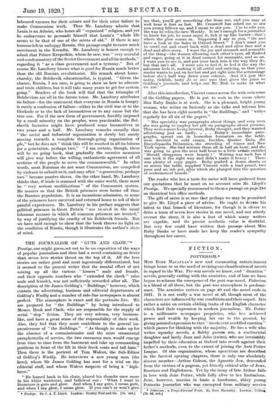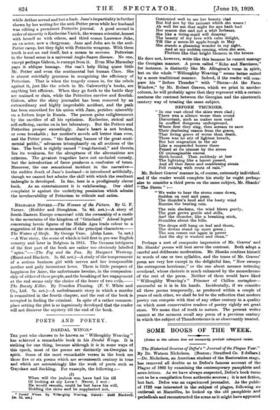FICTION.
POTTERISM.*
MISS Ross MACAULAY'S new and coruscating entertainment brings home to us the need of revising our classification of novels in regard to the War. Pre-war novels we know, and " duration " novels, generally ending with the armistice, and of late we have begun to witness the emergence of the post-war novel. PoUerism is a blend of all throe, but the post-war atmosphere is predomi- nant. The armistice arrives on page 40 and the novel ends in 1921. It is not really a war novel at all, though most of the characters are influenced by war conditions and their sequel. Itis rather a satire on certain abiding traits of the English character which find their expression in modern journalism. Mr. Potter is a millionaire newspaper proprietor, who has achieved power and wealth by keeping his ear to the ground, by giving pointed expression to that " incoherent muddled emotion " which passes for thinking with the majority. He has a wife who writes squashy novels, a flabby parson. son, a sentimental daughter and lastly Jane and John (twins), who are irresistibly impelled by their education at Oxford into revolt against their father's methods, even to the extent of joining the Anti-Potter League. Of this organization, whose operations are described in the farcical opening chapters, there is only one absolutely sincere member—Arthur Gideon, the Agnostic Jew, descended from the victims of a pogrom, yet bitterly critical alike of Jews, Russians and Englishmen. Yet by the irony of fate Arthur falls in love with Jane Potter, while fully alive to her limitations. Jane, however, marries in haste a handsome, shiny young Potterite journalist who was exempted from military service • Poaerisnt : a Tragi-Farcical Tract. By Rose Macaulay. London : Us. 6d. net.] while Arthur served and lost a limb. Janes impartiality is further shown by her writing for the anti-Potter press while her husband was editing a prominent Potterite journal. A good second in order of sincerity is Katherine Varick, the woman scientist, heneet with herself as with others, and third comes Laurence Juke„ an ex-actor, now a clergyman. Jane and John are, in the anti- Potter camp, but they fight with Potterite weapons. With them truth is not an end itself, but a means to success. Potterism in the broad sense is a universal Anglo-Saxon disease. No one,, except perhaps Gideon, is exempt from it. Even Miss Macaulay pays it oblique homage. She can't help liking queer little. Mr. Potter and even the sentimental but human Clare. She is almost suicidally generous in recognizing the efficiency of Potterism. That is when the tragedy comes in, for the rebels against it, just like the rebels in Mr. Galsworthy's books, are anything but efficient. When they go forth to the battle they are maimed or slain, while the Potterites survive and flourish. Gideon, after the shiny journalist has been removed by an extraordinary and highly improbable accident, and the path has been smoothed for his union with Jane, perishes miserably on a forlorn hope in Russia. The parson gains enlightenment by the sacrifice of all his optimism. Katherine, stoical and self.-surneing, carries on in her laboratory, But the Potters and Potterites prosper exceedingly. Jane's heart is not broken,, or even breakable ; her mother's novels sell better than ever,, and the Potter press, " the flaunting banner of the great senti- mental public," advances triumphantly on all sections: of the line. The. book is rightly named " tragi-farcieal," and therein. lies its weakness, for the abruptness of the alternations are extreme, The geatost tragedies have not excluded comedy,. but the introduction of fame produces a eonfueien of tones. Moreover, the one sensational incident in the narrative...–. the sudden death of Jane's husband—is introduced artificially, though we cannot but admire the skill with which the resultant imbroglio is developed. In fine,, here is a prodigiously clever book. As an entertainment it is exhilarating. Our chief complaint is against the underlying pessimism which admits. the invulnerability of Potterism to ridicule and satire.







































 Previous page
Previous page